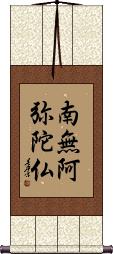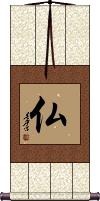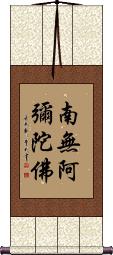Many custom options...
And formats...

Butsu in Chinese / Japanese...
Buy a Butsu calligraphy wall scroll here!
Personalize your custom “Butsu” project by clicking the button next to your favorite “Butsu” title below...
Namu Amida Butsu
南無阿弥陀仏 is the modern Japanese version of “Namu Amida Butsu” or “The Compassionate Amitabha Buddha.”
Some will translate this as “I sincerely believe in Amitabha; Lord have mercy on me.”
This phrase especially applies to Japanese Pure Land Buddhists.
There is a universal version using ancient characters (with more strokes) for the 4th and last characters. That version is also used in Chinese, Korean, and occasionally Vietnamese.
This is used to pay homage to Amitabha Buddha.
See Also: Bodhisattva | Buddhism | Nirvana
Buddha / Buddhism
Hotoke
仏 is the single Japanese Kanji that can mean Buddha or Buddhism.
This Kanji was a shorthand way to write 佛 (Buddha) in Chinese (popular around the 13th century). Somehow, this became the version of this Chinese character that was absorbed into Japanese and thus became part of standard Kanji. Centuries later, this character is not recognized in China (except for those from China with a background in Chinese literature or language).
仏 is also a rare or derivative Korean Hanja form - but I doubt you will find any Korean that knows that.
Namo Amitabha Buddha
南無阿彌陀佛 is how to express “The Compassionate Amitabha Buddha” (especially for the Pure Land Buddhist Sect).
Some will translate as “Homage to Amitâbha Buddha” or “I seek refuge in the Amitâbha Buddha.”
This is valid in Chinese characters, Japanese Kanji, and old Korean Hanja.
Sometimes modern Japanese use a different version of the 4th and last Kanji, but the version shown here is the most universal.
This is used to pay homage to Amitabha Buddha.
See Also: Bodhisattva | Buddhism | Nirvana
Not the results for butsu that you were looking for?
Below are some entries from our dictionary that may match your butsu search...
| Characters If shown, 2nd row is Simp. Chinese |
Pronunciation Romanization |
Simple Dictionary Definition |
仏 see styles |
fó fo2 fo butsu ぶつ |
More info & calligraphy: Buddha / Buddhism(1) (abbreviation) (See 仏陀・ぶっだ) Buddha; (2) (abbreviation) (See 仏教・ぶっきょう) Buddhism; (surname) Hotokesaki |
阿弥陀佛 see styles |
amidabutsu あみだぶつ |
More info & calligraphy: Amitabha Buddha |
阿彌陀佛 阿弥陀佛 see styles |
ē mí tuó fó e1 mi2 tuo2 fo2 o mi t`o fo o mi to fo Amida butsu |
More info & calligraphy: Amitabha BuddhaAmitâbha Buddha |
南無阿弥陀仏 see styles |
namuamidabutsu なむあみだぶつ |
More info & calligraphy: Namu Amida Butsu |
南無阿彌陀佛 南无阿弥陀佛 see styles |
nán wú ā mí tuó fó nan2 wu2 a1 mi2 tuo2 fo2 nan wu a mi t`o fo nan wu a mi to fo namo amida butsu |
More info & calligraphy: Namo Amitabha Buddha |
今佛 see styles |
jīn fó jin1 fo2 chin fo kin butsu |
present buddha |
佛佛 see styles |
fó fó fo2 fo2 fo fo butsu butsu |
buddhas |
佛器 see styles |
fó qì fo2 qi4 fo ch`i fo chi butsu ki |
articles for worship |
佛壽 佛寿 see styles |
fó shòu fo2 shou4 fo shou butsu ju |
Buddha's life, or age. While he only lived to eighty as a man, in his saṁbhogakāya he is without end, eternal; cf. Lotus Sutra, 壽量品, where Buddha is declared to be eternal. |
佛所 see styles |
fó suǒ fo2 suo3 fo so butsu sho |
buddha-places |
佛月 see styles |
fó yuè fo2 yue4 fo yüeh butsu gatsu |
The Buddha-moon, Buddha being mirrored in the human heart like the moon in pure water. Also a meaning similar to 佛日. |
佛見 佛见 see styles |
fó jiàn fo2 jian4 fo chien butsu ken |
The correct views, or doctrines, of the Buddha; Buddha doctrines. |
佛記 佛记 see styles |
fó jì fo2 ji4 fo chi butsu ki |
Buddha's prediction, his foretelling of the future of his disciples. |
入佛 see styles |
rù fó ru4 fo2 ju fo nyū butsu |
The bringing in of an image of a Buddha. |
十佛 see styles |
shí fó shi2 fo2 shih fo ju būtsu |
There are several, groups; that of the Huayan sūtra is Kāśyapa, Kanakamuni, Krakucchanda, Viśvabhū, Śikhin, Vipaśyi, Tiśya (or Puṣya), Tissa, ? Padma, and Dīpaṅkara. Another group is that of the Amitābha cult, one for each of the ten directions. There are other groups. |
四佛 see styles |
sì fó si4 fo2 ssu fo shi butsu |
Four of the Five Dhyāni-Buddhas. i.e. the four regional Buddhas; they are variously stated. The 金光明經 gives E. 阿閦; S. 寳相; W. 無量壽; N. 微妙聲. The 大日經 gives E. 寳幢; S. 大勤勇遍覺華開敷; W. 仁勝 (i. e. 無量壽); N. 不動, i. e. 鼓音如來. The 金剛頂經 gives 不動; 寳生; 觀自在, and 不 空 成就如來. v. 五智如來. |
如佛 see styles |
rú fó ru2 fo2 ju fo nyo butsu |
buddha-like |
崇佛 see styles |
chóng fó chong2 fo2 ch`ung fo chung fo sū butsu |
worship the Buddha |
念仏 see styles |
nenbutsu ねんぶつ |
(n,vs,vi) (1) {Buddh} (See 南無阿弥陀仏) nembutsu; nianfo; the three-word invocation "Namu Amida Butsu" dedicated to the Amitabha Buddha; (n,vs,vi) (2) {Buddh} visualizing a Buddha (in one's mind); (place-name, surname) Nenbutsu |
有佛 see styles |
yǒu fó you3 fo2 yu fo u butsu |
there is a buddha. |
ぷーっ see styles |
buutsu / butsu ブーツ |
boots |
一切佛 see styles |
yī qiè fó yi1 qie4 fo2 i ch`ieh fo i chieh fo issai butsu |
all buddhas |
一日佛 see styles |
yī rì fó yi1 ri4 fo2 i jih fo ichinichi butsu |
A one-day Buddha, i.e. he who lives a whole day purely. |
丈六佛 see styles |
zhàng liù fó zhang4 liu4 fo2 chang liu fo jōroku butsu |
sixteen-foot Buddha |
三世佛 see styles |
sān shì fó san1 shi4 fo2 san shih fo sanze butsu |
The Buddhas of the past, present, and future, i.e. Kāsyapa, Śākyamuni, and Maitreya. |
三千佛 see styles |
sān qiān fó san1 qian1 fo2 san ch`ien fo san chien fo sanzen butsu |
idem 三世. |
三尊佛 see styles |
sān zūn fó san1 zun1 fo2 san tsun fo sanzon butsu |
The three honoured Buddhas of the West: Amitābha, Avalokiteśvara, Mahāsthāmaprāpta. Though bodhisattvas, the two latter are called Buddhas when thus associated with Amitābha. |
三昧佛 see styles |
sān mèi fó san1 mei4 fo2 san mei fo Zanmai Butsu |
Samādhi Buddha, one of the ten Buddhas mentioned in the 華嚴經. |
不作佛 see styles |
bù zuò fó bu4 zuo4 fo2 pu tso fo fusa butsu |
does not become a buddha |
不動佛 不动佛 see styles |
bù dòng fó bu4 dong4 fo2 pu tung fo Fudō Butsu |
不動如來; 阿閦鞞 or 阿閦婆, Akṣobhya, one of the 五智如來 Five Wisdom, or Dhyāni-Buddhas, viz., Vairocana, Akṣobhya, Ratnasambhava, Amitābha, and Amoghasiddhi. He is especially worshipped by the Shingon sect, as a disciple of Vairocana. As Amitābha is Buddha in the western heavens, so Akṣobhya is Buddha in the eastern heaven of Abhirati, the realm of joy, hence he is styled 善快 or 妙喜, also 無瞋恚 free from anger. His cult has existed since the Han dynasty, see the Akṣobhya-Tathāgatasya-vyūha. He is first mentioned in the prajnapāramitā sutra, then in the Lotus, where he is the first of the sixteen sons of Mahābhijñā-jñānabhibhu. His dhyāni-bodhisattva is Vajrapāṇi. His appearance is variously described, but he generally sits on a lotus, feet crossed, soles upward, left hand closed holding robe, right hand fingers extended touching ground calling it as color is pale gold, some say blue a vajra is before him. His esoteric word is Hum; his element the air, his human form Kanakamuni, v. 拘. Jap. Ashuku, Fudo, and Mudo; Tib. mi-bskyod-pa, mi-'khrugs-pa (mintug-pa); Mong. Ülü küdelükci. v. 不動明王. |
Click here for more butsu results from our dictionary
The following table may be helpful for those studying Chinese or Japanese...
| Title | Characters | Romaji (Romanized Japanese) | Various forms of Romanized Chinese | |
| Namu Amida Butsu | 南無阿弥陀仏 | namu amida butsu namuamidabutsu | ||
| Buddha Buddhism | 佛 仏 | hotoke / butsu | ||
| Namo Amitabha Buddha | 南無阿彌陀佛 南无阿弥陀佛 | na mu a mi da butsu namuamidabutsu | nā mó ē mí tuó fó na1 mo2 e1 mi2 tuo2 fo2 na mo e mi tuo fo namoemituofo | na mo o mi t`o fo namoomitofo na mo o mi to fo |
| In some entries above you will see that characters have different versions above and below a line. In these cases, the characters above the line are Traditional Chinese, while the ones below are Simplified Chinese. | ||||
Successful Chinese Character and Japanese Kanji calligraphy searches within the last few hours...






